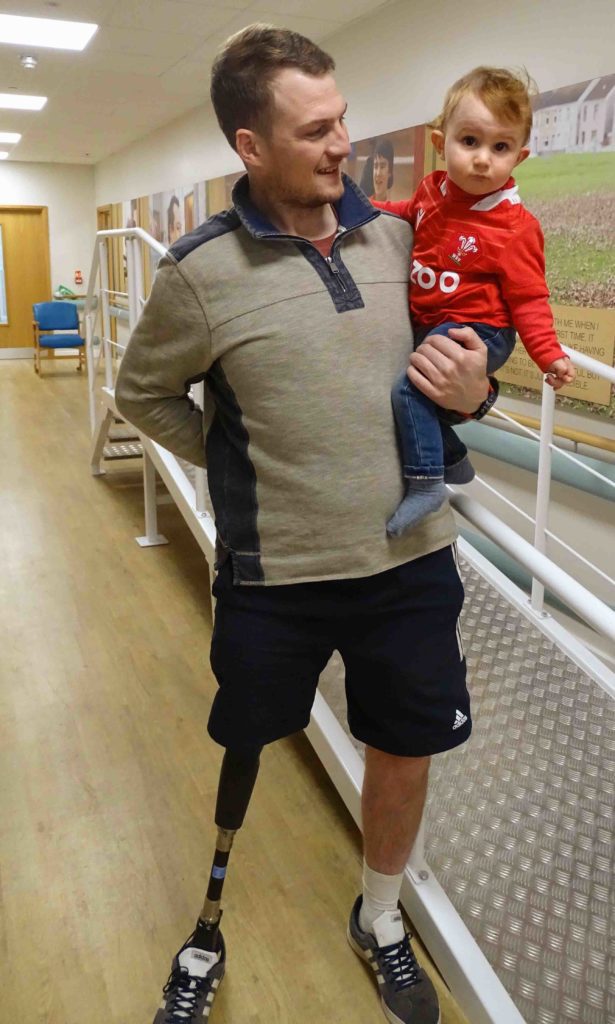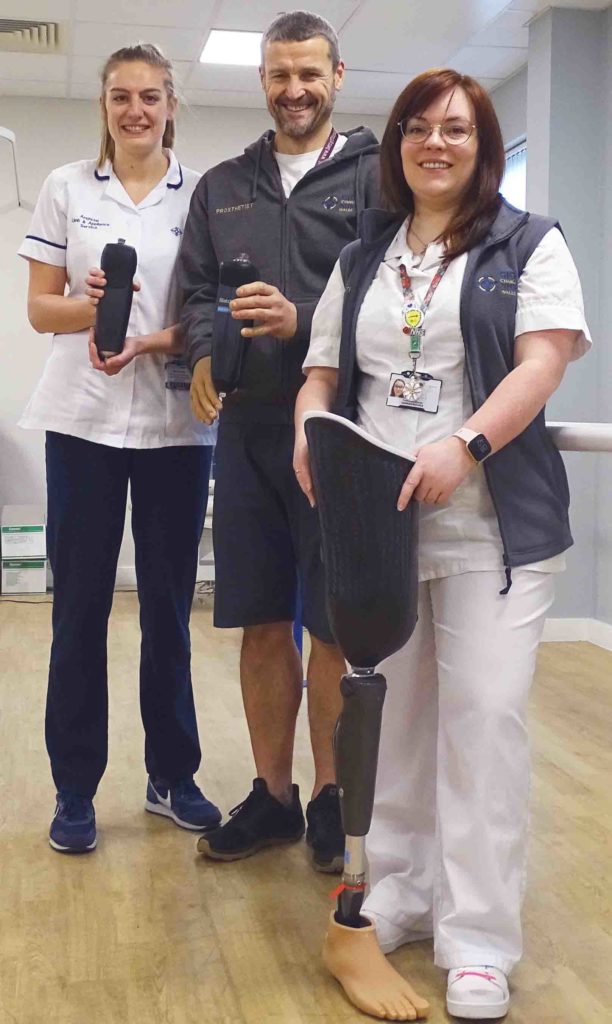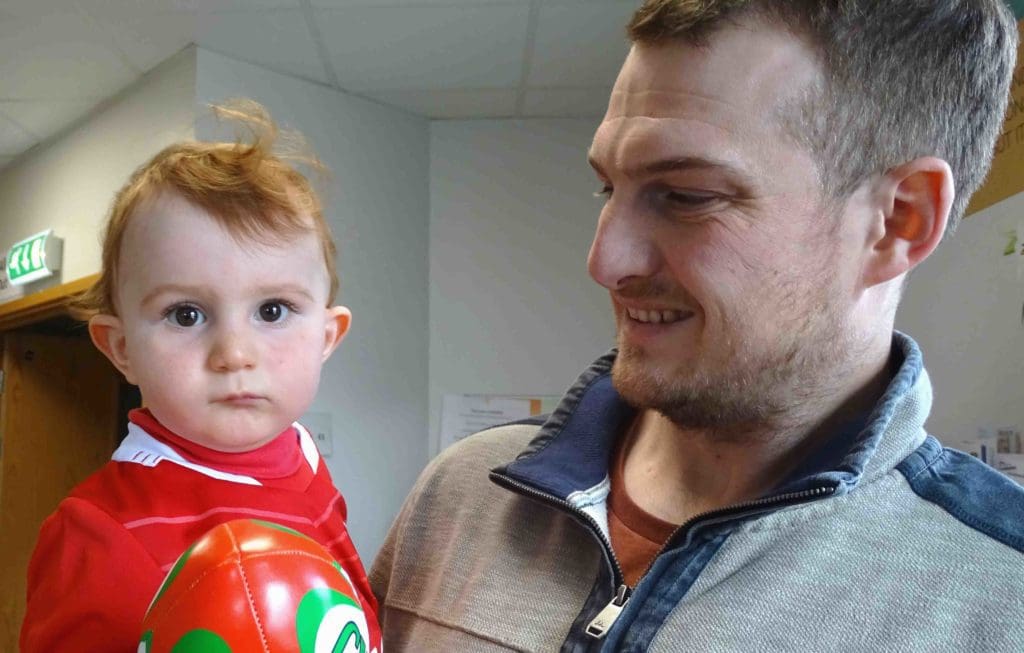A dad who lost his leg in a road crash can carry his baby son without fear of falling after being fitted with a high-tech artificial limb.
Richard Jones owes his life to a passing stranger, air ambulance medics and surgeons at Morriston Hospital after suffering critical injuries when the truck he was driving left the road three years ago.
Although surgeons were able to save his left leg they had no choice but to amputate the right above the knee.

Eventually, Richard was fitted with an artificial leg. But occasionally it would bend when he put his weight on it, causing him to fall. So when son Dougie came along, Richard was too nervous to carry him.
Now that is no longer a problem. Richard’s life has been transformed after he was fitted with a replacement leg, complete with a microprocessor knee, or MPK, providing far more stability.
“I had the old leg when Dougie was born,” said 33-year-old Richard. “I could have never have carried him with that leg.
“I’d only have to have it slightly bent If I put the weight on it and it would fold up, and I’d be on the floor.
“I had things I wanted to do but my main one was to carry Dougie around the house.
“After using the new MPK leg for a week or two, I was confident I could. It took a little bit of time but I started carrying him, walking with one stick, and then I progressed to no sticks.
“At the moment I’m not carrying him so much because he’s crawling. He follows me everywhere now.
“But the new knee has been absolutely life-changing for me. It has really pushed me on in my recovery, and my progress in everything.”
MPKs were first introduced in the NHS in Scotland, around 10 years ago. England, Northern Ireland and then Wales followed.
Two years ago, Swansea Bay became the first Welsh health board to provide them, with Welsh Government funding for 11 eligible patients a year, all of whom have had above-knee amputations.
MKPs are artificial knee joints with a built-in programmable computer that constantly controls the swing and stance phases of the leg’s movement, using sensors to adapt to the individual user’s gait.
The computer can then make adjustments in resistance so the user can walk more efficiently at different speeds and more safety down slopes, reducing stumbles and falls.
There are strict criteria relating to eligibility for MPKs in Wales. For example, patients must first have a comfortable-fitting socket, and already have a mechanical knee, which they can use to a good extent.
Jon Pini, prosthetist at Morriston Hospital’s Artificial Limb and Appliance Service (ALAS), said: “For most patients you would be looking at least a two-year process. We have done 11 a year for the last two years and we already have our 11 for next year.
“One question we do ask them is – would you go back to your mechanical knee? And all of them have said no.”
Richard is among those who would never go back. He had his MPK last July. It has not just allowed him to carry baby Dougie but transformed his life in other ways since the accident, which happened in February 2020.
Aged 30 and working in construction, he was driving a truck towards Johnstown in Carmarthen. He has no memories of the crash itself.
Police later told him he hit the barrier on a slip road and demolished a road sign, half-throwing him out of the vehicle. He suffered catastrophic injuries including a severed artery in the right leg.
Luckily an ex-army medic was on the scene and saved his life by applying tourniquets.
Then the Wales Air Ambulance arrived and consultant Dr Bob Tipping and critical care practitioner Marc Allen, both with the Emergency Medical and Retrieval Transfer Service, stabilised him.
Richard was then transferred by road ambulance to Morriston Hospital for emergency surgery.
“They operated all night at Morriston Hospital. The next morning, they came to the conclusion that it was either my leg or my life. They took my right leg from above the knee,” he said.
Richard spent two months in hospital before returning home to Tenby where he faced a long period of recovery.
Initially he worked with ALAS clinical lead physiotherapist Charlie Crocker. After that, specialist prosthetist Hannah Hughes provided him with his first artificial leg, which had a mechanical knee.
“Having so much damage to my left side, I really struggled with my balance and core strength,” Richard said.
“I worked on that, doing exercises at home, and just doing day-to-day things. Practising picking things up, trying to get on with my hobbies, which were clay pigeon shooting and fishing.
“But because you’re walking on uneven ground, your core strength is working all the time. With the first leg, it was impossible.”
During his time in Morriston he met nurse Michaela Sutton, who would eventually become his partner. They are now proud parents of Dougie, who celebrated his first birthday earlier this month.
Giving Richard the confidence and ability to carry their little boy around without the risk of falling is not the only difference the MPK has made.
“My biggest fear with the old leg was walking down hills,” he said. “With this leg I can yield through the knee, so I’m walking foot over foot, and I’m doing it a lot quicker.
“I still go upstairs one step at a time because it’s easier, but I can go downstairs step over step. I can use a pushbike in the gym, which has really helped with my fitness.”
Fishing and clay pigeon shooting are now so much easier, and Richard has started playing golf again too.
Unfortunately, his injuries mean he can no longer work in construction, but he is looking for an alternative career.

“It has let me get back to a lot of my hobbies and a lot of day-to-day things. Family life as well – it’s made it a lot easier doing jobs around the house,” Richard said.
“I can carry things without sticks and walk unaided around the house, and outside now as well. I’m doing it more and more every day.
“The MPK is incredible. An absolutely brilliant bit of kit. I’d never go back. I’d never be anywhere near where I am now, with my old leg.”
Morriston Hospital physiotherapist Laura Carter worked with Richard after he was fitted with his new leg. Laura said the availability of MPKs had made a massive difference to Richard and all the other patients.
“I absolutely love working with them,” she said. “I think there’s nothing better than giving our patients the best pieces of kit that we can give them, and seeing them do well on it.
“I feel really privileged to have the job that I have, to be able to do that.”

